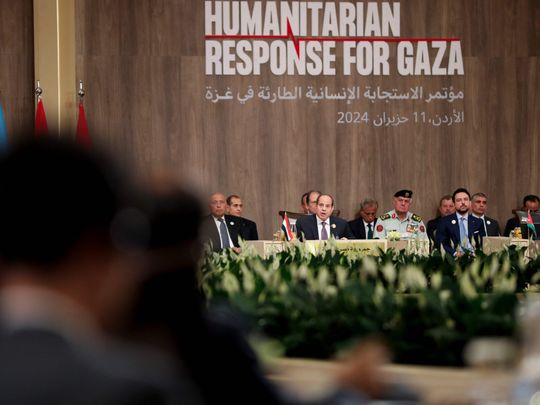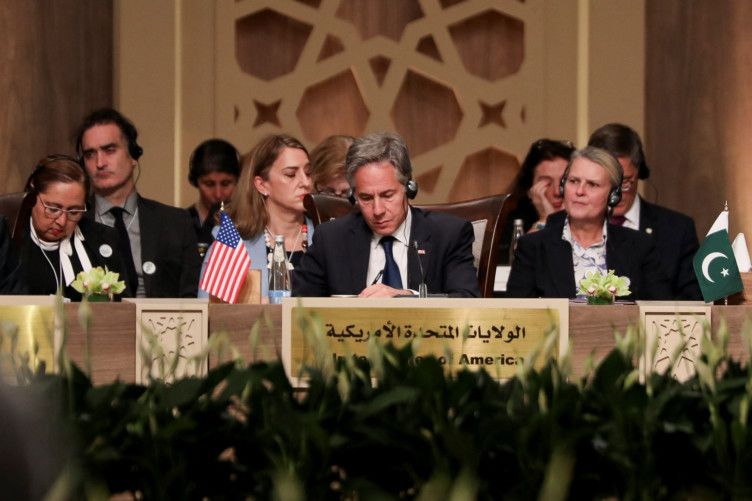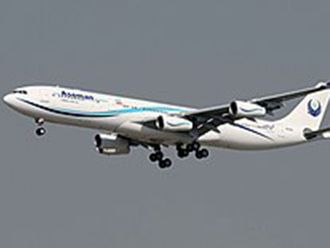
SWEIMEH, Jordan: Leaders at an emergency summit on Gaza’s humanitarian crisis pleaded Tuesday for greater aid access into the war-ravaged territory and backed a US-proposed ceasefire as the only long-term solution.
Jordan invited leaders from around the world to its Dead Sea coast for urgent talks as aid groups warn that conditions are worse than ever in Gaza, with virtually the whole population of more than two million people relying on sporadic aid deliveries.
“The horror must stop,” UN Secretary-General Antonio Guterres told the conference.
“The speed and scale of the carnage and killing in Gaza is beyond anything in my years as secretary-general,” he said.
UN humanitarian coordination Martin Griffiths described the Gaza war as a “stain on our humanity” and appealed for $2.5 billion to meet the humanitarian needs of Gazans from April until December.
Guterres voiced his backing for a ceasefire plan put forth by US President Joe Biden, under which Israel would withdraw from Gaza population centres and Hamas would free hostages in exchange for Palestinian prisoners.
The aid, announced at an emergency aid conference in Jordan, brings the total US contribution to Palestinians - in Gaza, the West Bank and the region - to $674 million since war broke out in October, according to the State Department.
But Blinken noted that a UN appeal for the Palestinians was only one-third funded, with a shortfall of some $2.3 billion.
“Some have expressed great concern over the suffering of the Palestinian people in Gaza, including countries with the capacity to give a lot, have provided very little or nothing at all,” Blinken told an emergency aid conference in Jordan.
“It is time for everyone - everyone - to step up. And for those who have already given and given generously, give more,” he said.
Blinken did not specify how the United States would deliver the assistance but Washington - the largest donor to the Palestinians - has focused on the World Food Programme and private aid groups.
The US Congress has banned further contributions to the main provider of assistance on the ground - UNRWA, the UN agency for Palestinian refugees.
Israel, long critical of UNRWA, alleged in January that a number of the agency’s employees may have participated in the October 7 attack. The agency fired the employees and promised to investigate.
US Secretary of State Antony Blinken flew to the Jordan conference from Israel where he made his latest push for the deal, insisting that Prime Minister Benjamin Netanyahu’s government was on board and that it was up to Hamas to agree.
But Blinken and others have said that there was no time to waste on the humanitarian situation in Gaza, where the United Nations has warned of the risk of famine.
Spanish Prime Minister Pedro Sanchez, an outspoken critic of Israel’s military operation, announced that his government would offer another 16 million euros ($17 million) in assistance.

Sanchez said that people around the world were looking to leaders to achieve “concrete results and actions to stop the suffering in Gaza”.
He praised the US diplomatic efforts for a ceasefire, saying that “now we call on Hamas and Israel to act in a responsible manner and seize the new opportunity in front of us”.
The incoming leader of Indonesia, the world’s largest Muslim-majority country, Prabowo Subianto, also travelled to the conference in Jordan and renewed offers to help.
He said Indonesia was ready to send medical teams, a field hospital and a hospital ship as well as to evacuate 1,000 people for medical treatment.
“Although we are willing to support and contribute to all these efforts, the final solution to this problem is a two-state solution,” Prabowo said.
Drastic aid needs
Israel’s military offensive has killed at least 37,164 people in Gaza, mostly civilians, according to Gaza’s health ministry.
It comes in response to Hamas’s October 7 attack, which resulted in the deaths of 1,194 people, mostly civilians, according to an AFP tally based on Israeli official figures.
Much of Gaza has been reduced to rubble and nearly all of its 2.4 million people displaced by the war that began on October 7 with Hamas’s attack on southern Israel.
Despite major initiatives including a specially built US pier, aid to Gaza remains severely restricted, particularly since the closure in May of the Rafah border crossing with Egypt - the main conduit for humanitarian and fuel deliveries - after Israeli troops seized the Palestinian side from Hamas.
Guterres on Tuesday said that since the closure of the border, “the flow of critical humanitarian assistance to the people of Gaza - which was already woefully inadequate - has plummeted by two-thirds”.
He estimated that more than 50,000 children required treatment for acute malnutrition.
Jordan’s King Abdullah II and Egyptian President Abdul Fattah Al Sissi, the co-hosts of the summit, also backed the calls for a ceasefire.
Sisi blamed the humanitarian crisis on Israel, saying it was “manufactured” and accusing Israel of using hunger as a weapon of war.
Israel denies the accusations and has put the onus on Egypt to reopen Rafah.
Egypt, along with Qatar and the United States, has played a key role in seeking to broker a ceasefire between Israel and Hamas in Gaza.
Egypt and Jordan were the first Arab countries to sign peace treaties with Israel in 1979 and 1994 respectively.






